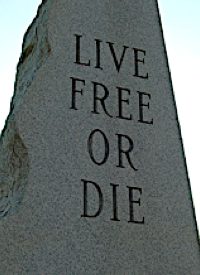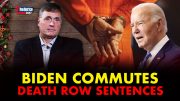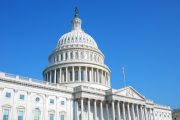
The event, sponsored by the Tenth Amendment Center and other conservative and libertarian organizations, was an invitation to "think outside the box," Woods said, and not just a rally of support for Republican opposition to President Barrack Obama.
"Unlike some people, we have principles that don't go away for four-year intervals," he said, "regardless of what letter is in front of the guy's name." He lamented the fact that in the nation's major media outlets, American politics is played out "somewhere between Joe Biden and Bob Dole. That's the whole range of acceptable opinion." To put it another way, he said, "Maybe our choices are not just Hillary Clinton or [Senate Republican leader] Mitch McConnell. We've got to break out of the box, crush it into the ground and set it on fire," he told the cheering crowd.
Woods, author of the book, Nullification: How to Resist Federal Tyranny in the 21st Century, was preaching to the choir of states' rights champions at an event promoting the idea that an individual state has the right to declare a federal law unconstitutional and thus null and void within the borders of that state. The Affordable Care and Patient Protection Act of 2010, commonly referred to as "ObamaCare" is a popular target of such efforts and the cover of Woods book has the word "NULLIFICATION," written in red, stamped over a picture of Obama, in a White House signing ceremony, signing the bill into law. But Woods cited several examples from U.S. history to show that the idea is neither new nor simply a revival of the nullification arguments used by slave-holders in the antebellum South. In fact, he noted, nullification was employed in many Northern states to resist compliance with federal legislation requiring the return of fugitive slaves to their masters.
"What about Wisconsin in 1850?" Woods asked, referring to that state's legislation formally nullifying the federal Fugitive Slave Act in Wisconsin. "They basically defied the federal law that said Wisconsin's got to return those slaves to their masters," he said. "Would those protesters [picketing the event] have said, 'Return those slaves to their masters'?" The center of the Underground Railroad activity to help slaves escape was in Cincinnati, Woods said, noting that nullification was being practiced in Ohio, not exactly a Southern slave-holding state. He said he didn't blame people who have never learned that history, since it is not taught in most schools.
"What I am blaming them for is remaining in ignorance when there is plenty of information available," he said, though he also blamed both the mainstream media and commentators on both the Left and the Right for what amounts to a conspiracy of silence about the history of nullification.
"The great pundits on talk radio won't touch these things with a 10-foot pole," he said, noting talk-show host Mike Church and economist Walt Williams, who sometimes is a guest host for Rush Limbaugh, as exceptions. The popular author and lecturer blamed the Supreme Court as well as a succession of Presidents and Congresses for the growth of federal power way beyond the limits established by the U.S. Constitution. The high court went 60 years without declaring any act of Congress unconstitutional, he said, though Congress has repeatedly cited the clause authorizing the regulation of interstate commerce as its justification for regulating and banning activities having nothing to do with interstate commerce. The court finally ruled one such act unconstitutional in 1995 in United States v. Lopez, when it ruled in a 5-4 decision that Congress had exceeded its authority in establishing gun-free zones around local schools. The argument the government made, Woods recalled, was that weapons around schools make students nervous, causing them to learn less and therefore be less productive when they enter the workforce, thus having a negative effect on interstate commerce.
The court finally said that was stretching the commerce clause a bit too far, but then went back to validating similar overreaches in which Congress cited the Interstate Commerce clause as its authorization, Woods said. The Supreme Court later claimed that Congress may, by authority of that clause, suppress the growing of marijuana for home consumption, following the argument it once used in upholding the fining of a farmer for using more than the number of acres on his own land than the federal government had allotted for the growing of wheat under the Agriculture Adjustment Act. In that case (Wickard v. Filburn, 1942), the court ruled that though the farmer used the added wheat to feed his own livestock, he would otherwise have had to buy the grain in the interstate market and his action therefore affected interstate commerce.
Simply arguing for limited constitutional government will not stop the expansion and abuse of federal authority, Woods said, if the federal government is left to decide the limits of its own powers. The federal judiciary is part of that government, he noted, so asking the courts to arbitrate is asking the government to be the judge in its own case.
"Oh, wise overlords tell us, were you intended to have this power?" Woods said, mocking such an appeal. "And they'll say, 'We've thought it over and the answer is, yes.'"
Centralized power within nation-states has made possible wars on a scale that made the 20th the bloodiest of all centuries, Woods said. "This is a modern development and I don't mean that as a compliment, " he said. While some may think nullification is a dead and discredited 19th-century doctrine, it is catching on today in various parts of the country, Woods said. The Tea Party candidate for governor in Kentucky, he said, wants to use nullification to stop the federal government from suppressing the growing of hemp in his state, he said. Michael Boldin, founder and executive director of the Tenth Amendment Center, noted Arizona recently became the 15th state to pass a law allowing the use of marijuana for medical purposes, despite the federal prohibition. Resistance to enforcement of the federal ban became so strong in California and in other states that U.S. Attorney General Eric Holder announced in 2009 that the Justice Department would no longer take actions against dispensaries of medical marijuana where it is legal under state law. Boldin recalled that Californians had previously "linked arms and formed a human shield" to block federal agents from shutting down dispensaries in that state.
"When you get enough people in enough states saying 'no' to Washington, D.C., there's not much that they can do," Boldin said in an interview with The New American.
"Nullification will restore sovereignty to the people of the states," Art Thompson, CEO of The John Birch Society, said in his address to the conference. Thompson said if the federal government were limited to the powers delegated to it by the Constitution, it would be roughly 20 percent of its present size. "That will balance the budget," he said. The key is organizing and educating people in opposition to those public-service employees and others who seek advantages from a large and growing government.
"They've been able to out organize us for a very long time," Thompson said, but he noted that The John Birch Society has been carrying out its mission to organize and educate down to the neighborhood level. "We've been effective, but we do it quietly," he said.
"People are getting organized and getting active," Thompson said. "Keep it up. We're going to win this thing."
Photo: New Hampshire motto
Related Articles:



